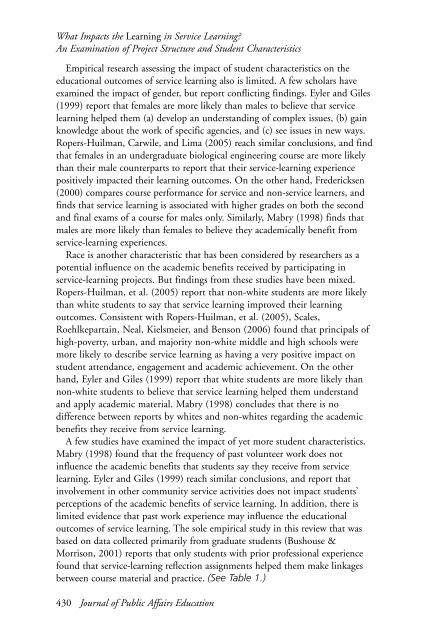JOURNAL OF PUBLIC AFFAIRS EDUCATION - National ...
JOURNAL OF PUBLIC AFFAIRS EDUCATION - National ...
JOURNAL OF PUBLIC AFFAIRS EDUCATION - National ...
Create successful ePaper yourself
Turn your PDF publications into a flip-book with our unique Google optimized e-Paper software.
What Impacts the Learning in Service Learning?<br />
An Examination of Project Structure and Student Characteristics<br />
Empirical research assessing the impact of student characteristics on the<br />
educational outcomes of service learning also is limited. A few scholars have<br />
examined the impact of gender, but report conflicting findings. Eyler and Giles<br />
(1999) report that females are more likely than males to believe that service<br />
learning helped them (a) develop an understanding of complex issues, (b) gain<br />
knowledge about the work of specific agencies, and (c) see issues in new ways.<br />
Ropers-Huilman, Carwile, and Lima (2005) reach similar conclusions, and find<br />
that females in an undergraduate biological engineering course are more likely<br />
than their male counterparts to report that their service-learning experience<br />
positively impacted their learning outcomes. On the other hand, Fredericksen<br />
(2000) compares course performance for service and non-service learners, and<br />
finds that service learning is associated with higher grades on both the second<br />
and final exams of a course for males only. Similarly, Mabry (1998) finds that<br />
males are more likely than females to believe they academically benefit from<br />
service-learning experiences.<br />
Race is another characteristic that has been considered by researchers as a<br />
potential influence on the academic benefits received by participating in<br />
service-learning projects. But findings from these studies have been mixed.<br />
Ropers-Huilman, et al. (2005) report that non-white students are more likely<br />
than white students to say that service learning improved their learning<br />
outcomes. Consistent with Ropers-Huilman, et al. (2005), Scales,<br />
Roehlkepartain, Neal, Kielsmeier, and Benson (2006) found that principals of<br />
high-poverty, urban, and majority non-white middle and high schools were<br />
more likely to describe service learning as having a very positive impact on<br />
student attendance, engagement and academic achievement. On the other<br />
hand, Eyler and Giles (1999) report that white students are more likely than<br />
non-white students to believe that service learning helped them understand<br />
and apply academic material. Mabry (1998) concludes that there is no<br />
difference between reports by whites and non-whites regarding the academic<br />
benefits they receive from service learning.<br />
A few studies have examined the impact of yet more student characteristics.<br />
Mabry (1998) found that the frequency of past volunteer work does not<br />
influence the academic benefits that students say they receive from service<br />
learning. Eyler and Giles (1999) reach similar conclusions, and report that<br />
involvement in other community service activities does not impact students’<br />
perceptions of the academic benefits of service learning. In addition, there is<br />
limited evidence that past work experience may influence the educational<br />
outcomes of service learning. The sole empirical study in this review that was<br />
based on data collected primarily from graduate students (Bushouse &<br />
Morrison, 2001) reports that only students with prior professional experience<br />
found that service-learning reflection assignments helped them make linkages<br />
between course material and practice. (See Table 1.)<br />
430 Journal of Public Affairs Education

















